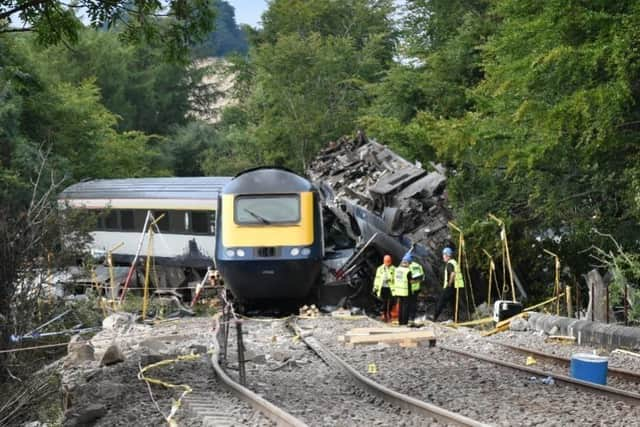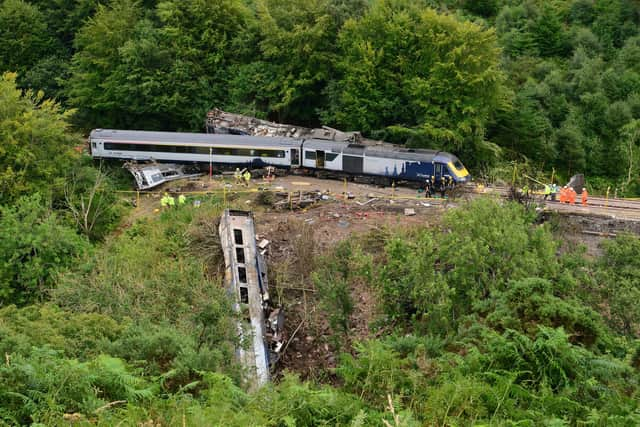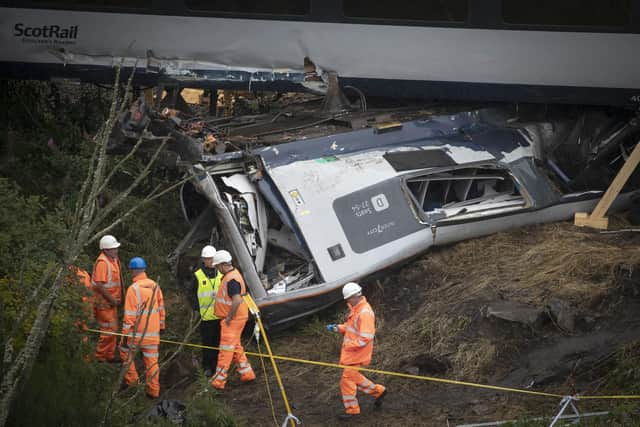Stonehaven crash: Network Rail signaller told ScotRail driver ‘everything’s fine’
The driver of the ScotRail train who was among three people killed after it crashed into debris washed onto the tracks had just been told by a Network Rail signaller that “everything’s fine” moments before the derailment, the High Court in Aberdeen has heard.
The revelation came as the UK Government-run infrastructure body admitted health and safety failings over the derailment at Carmont, south of Stonehaven in Aberdeenshire, on August 12, 2020.
Advertisement
Hide AdAdvertisement
Hide AdTrain driver Brett McCullough, 45, conductor Donald Dinnie, 58, and passenger Christopher Stuchbury, 62, died in the incident, which happened after torrential rain, described in court as “biblical”, engulfed a wrongly-built drain.


The day of the crash had been the Stuchburys’ wedding anniversary, his wife Diane said in a statement read at the court hearing on Thursday.
Network Rail admitted failing to ensure those aboard the train were not exposed to the "risk of serious injury and death from train derailment" as a result of failures in the construction, inspection and maintenance of drainage assets and in adverse and extreme weather planning.
It also admitted failing to ensure a drain built by now-defunct contractor Carillion in 2011/12 was "constructed properly" and in accordance with the design drawings, and failed to conduct a handover meeting with the contractors to check that.
The body further admitted it did not have an adequate system of training in place to analyse weather forecasts, which resulted in no emergency extreme weather action teleconference on the day of the crash.


It also failed to impose an emergency speed restriction "in absence of current information about the integrity of the railway line and drainage assets between Montrose and Stonehaven", and failed to inform the driver that it was unsafe to drive at the line speed of 75mph or caution him to reduce his speed.
The Scotsman revealed in January that Network Rail would be prosecuted over the crash, and revealed the hearing date in August.
Alex Prentice KC, prosecuting, told the court that recordings of a conversation between Mr McCullough and the Carmont area signaller prior to the crash confirmed the train driver queried whether there was a reduced speed limit in place on the line to Stonehaven.
Advertisement
Hide AdAdvertisement
Hide AdThe signaller told Mr McCullough: "Eh no, everything's fine between myself and Stonehaven.”


The court heard that when Mr McCullough pulled the emergency brake, there was "insufficient time" for it to have any impact on the train's speed.
The train derailed at 9:37am after it struck gravel and other stony material washed out from the drain. It then hit the side of a bridge, causing its power car and one of its four carriages to fall down an embankment.
Diane Stuchbury said her life had been “ripped apart” by the death of her husband in the crash.
He had been travelling to Dalmeny in South Queensferry, but his first train had been cancelled due to the severe weather. A member of ScotRail staff told Mr Stuchbury he could get on the Glasgow-bound train instead and change at Dundee.
Mrs Stuchbury’s statement read: "The 12th August in our house was a special day – the day we married. He had one last trip before retirement.
"On that day in 2020, our lives were ripped apart. He and I have been robbed of a future together as a family."
A Rail Accident Investigation Branch (RAIB) report published in March last year found errors in the construction of a drainage system installed by Carillion meant it was unable to cope with heavy rain, which fell in the area on the morning of the crash. Carillion went into compulsory liquidation in January 2018.
Advertisement
Hide AdAdvertisement
Hide AdThe RAIB report made 20 recommendations to improve railway safety, 13 of which were directed at Network Rail. It concluded that if the drain had been built correctly, it would have been able to cope with the volume of water.
The report said: “It would have been capable of safely accommodating the flow of surface water that occurred on the morning of August 12, 2020 without causing gravel to be washed away down the steeply sloping trench towards the track”.
Among the six passengers who survived the crash with injuries was conductor Nicola Whyte, 31, who was travelling on the train as a passenger as the service she had initially been allocated to travel on had been cancelled.
In a statement read out in court by Mr Prentice, Ms Whyte said her life has "completely changed" since the crash.
She said: "I have suffered three years of anxiety, nightmares and being unable to sleep. I jump at loud noises and rarely use buses or trains anymore, and aeroplanes are out of the question."
Mr Prentice detailed how Ms Whyte had to give up her ambition of becoming a train driver and also her job as a conductor that she "loved".
Her statement added: "It has also had an impact on my partner and family as they have had to help me heal. That day hurt me physically, mentally and also financially, and feels like my life has been put on hold."
Mr Prentice also told the court about the rescue operation to recover those injured in the crash. Each day, 75 police officers were involved in securing the site, which was closed for nearly two months.
Advertisement
Hide AdAdvertisement
Hide AdMr Prentice said: "The response was one of the most complex rescues experienced by the responding agencies.”
He told the court details of 25 separate incidents that had occurred on the rail network across Scotland as a result of the severe weather on the evening of Tuesday, August 11, 2020 and the following morning, including points failures, lightning strikes and severe flooding.
Mr Prentice said there had been "no strategic overview of the situation" on the part of Network Rail, which dealt with each of them as an isolated incident rather than as part of the severe weather event. He also said the company's route control staff "did not suitably assess risks" with regards to the weather.
The court heard there had been severe weather resulting in disruption across the rail network in the north east of Scotland on the day of the crash.
Mr Prentice said passengers affected by cancelled trains as a result of torrential rain described it as "biblical", and both Aberdeenshire Council and Aberdeen City Council had declared a major emergency due to the weather.
ScotRail has said pre-pandemic, the 6:38am Aberdeen-Glasgow service would have carried 25 to 30 passengers – up to six times as many – and the RAIB said “the casualty toll would almost certainly have been significantly higher”.
The hearing will continue on Friday when the defence will make its submission.
Comments
Want to join the conversation? Please or to comment on this article.